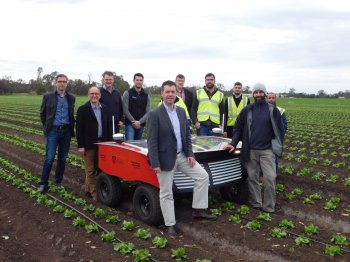
The robot, named RIPPA (Robot for Intelligent Perception and Precision Application), has the ability to collect data using sensors that can map an area of a crop and detect weeds as well as highlight foreign objects.
The University of Sydney’s Australian Centre for Field Robotics director of innovation and research Professor Salah Sukkarieh said on top of that, it can also use this data to estimate yield and fertilise crops. “RIPPA was developed six months ago and for the first time will be trialled outside of New South Wales,” he said. “At Gatton, the robot will experience new soil types and new crops for the first time.”
Professor Sukkarieh said the robot has a collection of sensors and sophisticated algorithms that can detect weeds from amongst the crop as well as foreign objects such as a stone, glass or metal.
The next step is to build systems that can remove the weed and the foreign object. Horticulture Innovation Australia, the organisation that commissioned RIPPA using industry funds and matched funding from the Australian Government, said food safety is a huge priority for growers and the whole supply chain.
“RIPPA gives us an insight into a future not too far away where growers can have increased assurance that no foreign matter has slipped through the cracks. Currently there is only so much that can be detected with the human eye, and the results can be devastating,” Dr Anthony Kachenko said. “It’s also great to be watching the capacity of this farmbot steadily increase. At the moment it can estimate yield, spray weeds and fertiliser, and it can run up to 21 hours straight. It’s exciting to think that such robots could be available to growers in Australia in about five years’ time.”
The 250 kilogram solar-powered robot will spend three hours moving up and down vegetable growing rows, during which time it will convey extensive data live to the laptop of Sydney university researchers.
Rugby Farm co-owner, Dan Hood, said when offered the opportunity to trial the machinery on his farm which produces 14,000 acres of vegetables a year, he jumped at the chance.
“We are very keen to see new technologies come online that make the business of producing vegetables easier,” he said. “Managing weeds can be a difficult and time consuming activity, and if not controlled can be detrimental to both the yield and quality of our crops. Weeds can be removed by hand, chipping hoe, mechanical scuffling or by sprays. All are expensive and we are struggling to find people with the skills and the perseverance to do this type of work.
"We are hoping RIPPA will provide a cost effective solution to this challenging problem. An autonomous system that has the capacity to do all this 24-hours-a-day could save money and improve accuracy, and we are extremely excited to be part of this trial.”



 Classifieds
Classifieds

